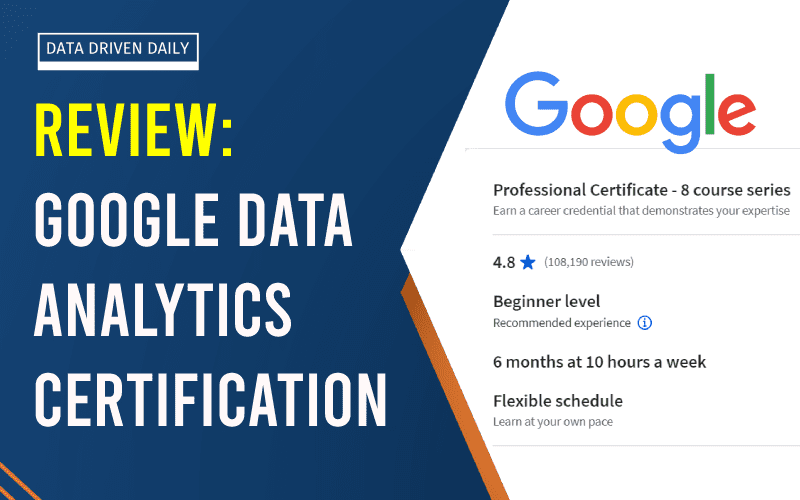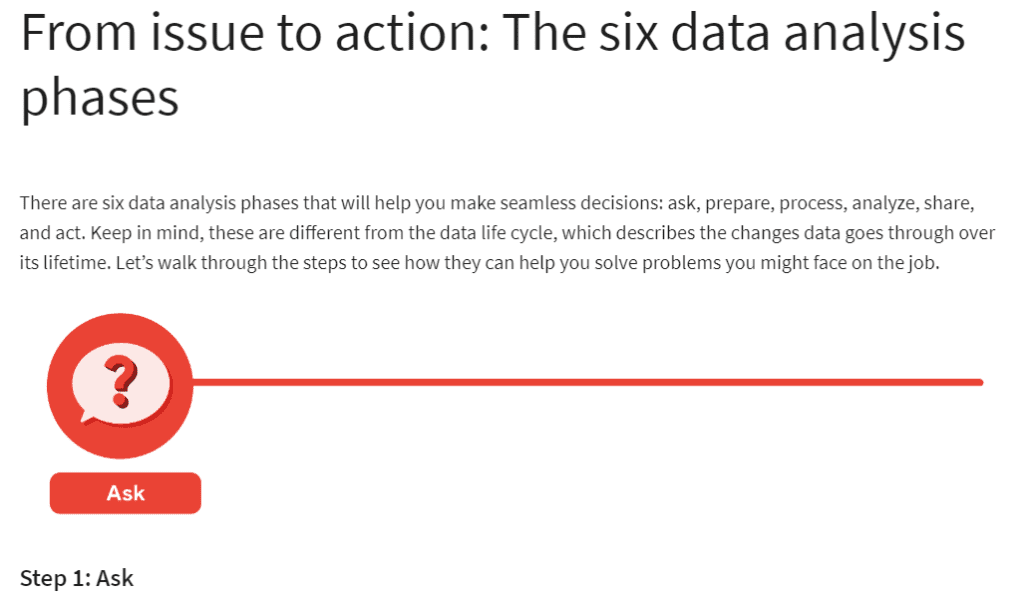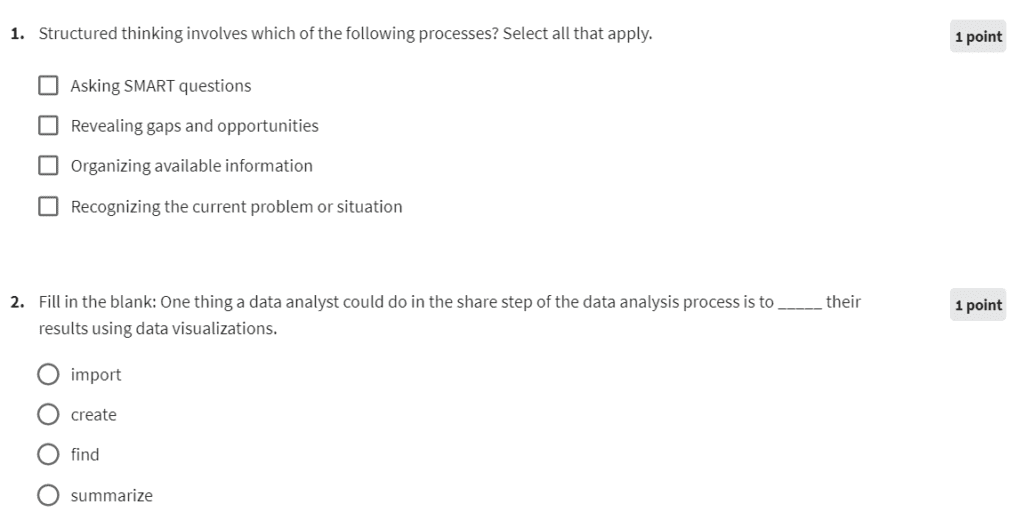Welcome to this comprehensive review on the Google Data Analytics Certification.
We’ll cover everything you need to know about this valuable certification, including its benefits, course content, exam process, and practical tips for success.
We’ll also discuss the types of jobs this certification can lead to, how to include it on your resume, and share real-world insights from users who have taken the course.
Let’s get started!

What is Google Data Analytics Certification?
The Google Data Analytics Certification is a beginner-friendly, professional certification program designed to equip you with essential data analytics skills.
Offered by Google, this certification is recognized globally and covers a broad range of topics, from data cleaning and analysis to visualization and presentation.
Why Should You Consider This Certification?
There are several great reasons to choose Google Data Analytics Certification:
- Industry recognition: Google is a well-known company, and its certification holds weight in the job market. Employers trust Google’s training, so certified professionals become more attractive job candidates.
- Comprehensive curriculum: This certification covers all aspects of data analytics, so you’ll develop a well-rounded skillset.
- No prerequisites: Whether you’re a beginner or an experienced professional looking to upskill, this certification is suitable for you.
- Cost-effective: The program is relatively affordable compared to other data analytics certifications, making it accessible to a wider audience.
What Will You Learn?
Google Data Analytics Certification is not extremeley hard, and consists of eight sequential courses:
Course 1: Foundations: Data, Data, Everywhere
Learn the basics of data analytics and understand the role of a data analyst.
Week 1: Introduction to data analytics

Helpful and engaging videos are available to summarize the weeks’ content.

Lots of reading on specific subjects – this is where the majority of the time is spent.

Short quizzes to test your knowledge and check you’ve been keeping up with the material. This general format is what you will be seeing each week.
Week 2: All about analytical thinking
Week 3: The wonderful world of data
Week 4: Set up your toolbox
Week 5: Endless career possibilites
Course 2: Ask Questions to Make Data-Driven Decisions
Develop critical thinking and problem-solving skills in a data-driven context.
Course 3: Prepare Data for Exploration
Learn how to collect, organize, and clean data to make it ready for analysis.
Course 4: Process Data from Dirty to Clean
Master data cleaning techniques and handle missing or inconsistent data.
Course 5: Analyze Data to Answer Questions
Discover how to analyze data using various techniques and tools.
Course 6: Share Data Through the Art of Visualization
Learn to create effective data visualizations to communicate insights.
Course 7: Data Analysis with R Programming
Get familiar with the R programming language and its applications in data analysis.
Course 8: Google Data Analytics Capstone
Apply your skills to a real-world data analysis project.
The Certification Exam: What to Expect
The Google Data Analytics Certification exam is a crucial step in obtaining the certification. In this section, we’ll provide an in-depth overview of what to expect during the exam and offer helpful tips on how to prepare and succeed.
Exam Structure and Content
The Google Data Analytics Certification exam is an online, proctored, and timed test designed to assess your understanding of the material covered in the eight-course program. The exam consists of multiple-choice questions and scenario-based questions, which test your knowledge and practical application of data analytics concepts, techniques, and tools. The questions will cover topics such as:
- Data analytics foundations and the role of a data analyst
- Critical thinking and problem-solving in a data-driven context
- Data collection, organization, and cleaning
- Data analysis techniques and tools
- Data visualization and presentation
- R programming for data analysis
- Real-world data analysis scenarios
Exam Duration and Passing Score
The certification exam typically takes between 2 to 3 hours to complete, though the exact duration may vary depending on the number of questions and their complexity. To pass the exam, you’ll need to achieve a certain passing score, which is determined by Google. Keep in mind that the passing score may change over time, so always check the latest information on the certification website.
Tips for Exam Preparation and Success
Here are some strategies to help you prepare for the exam and increase your chances of success:
- Review the course material: Thoroughly review all the course content, including videos, quizzes, and practice exercises. Focus on areas where you feel less confident or have difficulty understanding the concepts.
- Take notes: Create a summary of key concepts, techniques, and tools from each course. This will serve as a useful reference when you’re reviewing the material and preparing for the exam.
- Apply your knowledge: Work on real-world data analysis projects to solidify your understanding of the material and gain practical experience. This will help you become more comfortable with applying the concepts you’ve learned in a real-world context.
- Practice with sample questions: Familiarize yourself with the types of questions you may encounter on the exam by attempting sample questions or mock exams. This will help you become more comfortable with the exam format and improve your time management skills.
- Develop a study plan: Allocate sufficient time for exam preparation and create a study plan that covers all the topics in the certification program. Stick to your plan and make adjustments as needed based on your progress and understanding of the material.
- Join online forums or study groups: Connect with fellow learners in online forums or study groups to discuss course material, share insights, and seek answers to your questions. Learning from others can provide valuable perspectives and help reinforce your understanding of the material.
- Take breaks and stay healthy: Don’t forget to take breaks during your study sessions, as this can help prevent burnout and improve retention. Maintain a healthy lifestyle by getting enough sleep, eating well, and exercising regularly.
Exam Day Tips
On the day of the exam, follow these tips to ensure a smooth testing experience:
- Check your equipment: Make sure your computer, internet connection, and webcam are working properly before the exam.
- Prepare your testing environment: Choose a quiet, well-lit space with minimal distractions for taking the exam.
- Keep your identification handy: You’ll need to present a valid form of identification during the exam’s check-in process, so have it readily available.
- Manage your time: Allocate your time wisely during the exam, ensuring you leave enough time to answer all the questions and review your work if needed.
- Stay calm and focused: Keep a positive mindset and remain calm throughout the exam. If you encounter a difficult question, don’t panic. Take a moment to gather your thoughts and approach the question logically.
- Use the process of elimination: If you’re unsure about the answer to a multiple-choice question, try to eliminate options you know are incorrect. This can help narrow down your choices and increase your chances of selecting the correct answer.
- Flag questions for review: If you’re uncertain about a question, flag it for review and return to it later if you have time. This will help ensure you don’t spend too much time on a single question and miss out on answering others.
- Read the questions carefully: Make sure you read each question thoroughly and understand what’s being asked before selecting your answer. Pay attention to any keywords or phrases that may indicate the specific concept being tested.
- Trust your instincts: If you’ve prepared well for the exam, trust your instincts when answering questions. Don’t second-guess yourself too much, as this can lead to unnecessary stress and wasted time.
- Breathe and stay positive: Remember to take deep breaths and maintain a positive attitude throughout the exam. A calm and focused mind will help you perform better and recall the information you’ve learned more effectively.
By following these tips and adequately preparing for the Google Data Analytics Certification exam, you’ll be well on your way to obtaining the certification and unlocking new opportunities in the field of data analytics.
Jobs and Opportunities
Google Data Analytics Certification can open doors to various job opportunities. Let’s explore some positions where this certification is relevant and discuss how the skills you gain apply to each role:
Data Analyst
As a data analyst, you’ll be responsible for collecting, processing, and analyzing data to help organizations make data-driven decisions. The certification teaches you data cleaning, analysis, and visualization techniques, which are crucial in this role. Additionally, the R programming knowledge you gain will enable you to perform advanced statistical analysis.
Business Analyst
Business analysts work closely with stakeholders to identify and solve business problems using data. The certification’s emphasis on critical thinking and problem-solving in a data-driven context is highly relevant for this role. Furthermore, the ability to create effective data visualizations will help you communicate insights to stakeholders in a clear and impactful way.
Marketing Analyst
Marketing analysts use data to measure the effectiveness of marketing campaigns and identify areas for improvement. The certification’s focus on data analysis techniques, such as segmentation and trend analysis, will help you uncover insights about customer behavior and preferences, enabling you to make data-driven recommendations for marketing strategies.
Financial Analyst
Financial analysts use data to evaluate investment opportunities, assess financial risks, and make recommendations to management. The certification provides a strong foundation in data analysis, which can be applied to financial data, such as historical stock prices or financial ratios. Additionally, the R programming skills you acquire can be used to build financial models and perform risk analysis.
Healthcare Analyst
Healthcare analysts work with data to improve patient care, optimize healthcare processes, and identify cost-saving opportunities. The certification’s focus on data cleaning and preparation is particularly relevant in this role, as healthcare data can often be messy and inconsistent. The data analysis techniques you learn will help you identify patterns and trends in patient outcomes, resource utilization, and healthcare quality.
Operations Analyst
Operations analysts use data to optimize business processes, increase efficiency, and reduce costs. The certification’s comprehensive curriculum covers a range of data analysis techniques that can be applied to operational data, such as production metrics, inventory levels, and supply chain data. The ability to create clear data visualizations will help you communicate your findings and recommendations to stakeholders involved in operations management.
The Google Data Analytics Certification not only demonstrates your ability to work with data and make data-driven decisions but also equips you with skills that are valuable in roles such as project management, product management, and consulting.
Including the Certification on Your Resume
To maximize the impact of your Google Data Analytics Certificate, consider the following tips when adding it to your resume:
- Create a dedicated section: Under a section titled “Certifications,” list your Google Data Analytics Certificate along with the date you obtained it.
- Mention relevant skills: Highlight specific skills you gained from the certification in your “Skills” section, such as data cleaning, data visualization, or R programming.
- Include in your summary: Briefly mention your certification in your resume summary or objective to showcase your expertise right from the start.
- Emphasize in your experience: If you’ve used your data analytics skills in previous roles, mention those accomplishments in your “Experience” section, emphasizing the positive impact your skills had on the projects or tasks.
Real-World Insights from Reddit Users
Let’s take a look at what some Reddit users have to say about their experiences with the Google Data Analytics Certificate:
- u/slayerdawg: “I started my 1-week free trial on Sunday. I had decent background knowledge of data analytics, excel, and sql. The 8 course certificate has been pretty painless so far, and I will finish the 5th course tomorrow. The “6 month course” is probably more like a 1 to 2 month course for anyone with some experience.” source
- u/Opening_Cranberry_98: “The course itself is amazing to couple with a degree. I’m an engineer, and what the course teaches and introduces you to resonates throughout every aspect of my field. It is basic, but it opens you up to the entire world of Data Analytics but more importantly, how this will give you an edge in your field. As for stand alone, it might be difficult to find your way into the professional world since it is so broad. They explained this during one of the course however.” source
- u/cat6Wire: “What I liked so much about the course was the sense of immersion and teamwork (although artificial), it gave me a sense of what Data Analysis is about, what it’s for, and who it’s for: the stakeholders. This is real life. Technical skills are great – I love learning about Python Pandas & Jupiter notebooks from other courses. But the whole point is the product, the delivery, the service: what can you bring to the table, what useful business insights can you provide to the team to make a better, more profitable move based on your data collection and analysis. I recommend this course as a great intro for the data analytics novice, but you must participate and invest yourself into it, like any other project. Otherwise it will be a waste of time for you. Finally I will say that after finishing this course, I springboarded into Udemy courses on much more advanced SQL, Python Pandas for Data Analysis and Tableau, and of course practice practice practice!” source
Tips for Success
Here are some helpful tips to maximize your chances of acing the certification:
- Complete all courses: Make sure to finish all eight courses, as each one builds on the previous one.
- Practice exercises and quizzes: Reinforce your learning by completing the quizzes and practice exercises throughout the courses.
- Engage in online forums: Connect with fellow learners in online forums to gain valuable insights and answers to your questions.
- Apply your skills: Work on real-world data analysis projects to solidify your understanding and gain practical experience.
- Review materials: Before taking the certification exam, go through all the course materials to refresh your memory on key concepts.
Frequently Asked Questions (FAQs)
What is the Google Data Analytics Certification?
The Google Data Analytics Certification is a professional certification offered by Google that validates your knowledge and skills in the field of data analytics. It consists of eight self-paced online courses, covering a wide range of topics, including data analysis fundamentals, data visualization, and R programming. Upon completion of the courses and passing the certification exam, you’ll receive a certificate from Google, demonstrating your proficiency in data analytics.
How long does it take to complete the certification program?
The program is designed to be completed in approximately six months if you dedicate around 10 hours per week to the coursework. However, the actual time it takes to complete the program will vary depending on your prior experience and the amount of time you can dedicate to the courses. Some learners with experience in data analytics may complete the program in as little as 1 to 2 months.
How much does the Google Data Analytics Certification cost?
The Google Data Analytics Certification program is available through Coursera, and you can access the course content with a Coursera Plus subscription. Coursera Plus costs $59/month or $399/year, which provides unlimited access to the certification program as well as many other courses on the platform. Coursera also offers financial aid for eligible learners who may need assistance covering the cost of the subscription.
Is the Google Data Analytics Certification worth it?
The Google Data Analytics Certification is an excellent choice for individuals looking to enter or advance in the field of data analytics. The certification provides a comprehensive curriculum that covers key data analytics concepts and techniques, making it suitable for beginners and professionals seeking to expand their skillset. Additionally, as a Google certification, it is widely recognized and respected by employers.
Can I get a job with the Google Data Analytics Certification?
While the Google Data Analytics Certification can help you stand out in the job market and demonstrate your expertise in data analytics, it’s important to remember that landing a job typically depends on a combination of factors, such as your prior experience, education, and networking efforts. The certification can be a valuable addition to your resume, but it’s essential to also focus on building a strong portfolio, gaining practical experience, and networking with professionals in the industry.
What job roles can I pursue with the Google Data Analytics Certification?
The Google Data Analytics Certification is relevant to various job roles in the data analytics field, including data analyst, business analyst, marketing analyst, financial analyst, healthcare analyst, and operations analyst. Additionally, the skills you gain from the certification can also be valuable in roles such as project management, product management, and consulting.
How can I prepare for the Google Data Analytics Certification exam?
To prepare for the certification exam, it’s crucial to review all course materials, take notes, practice with sample questions, and apply your knowledge in real-world data analysis projects. Additionally, engaging in online forums or study groups, developing a study plan, and maintaining a healthy lifestyle can help improve your chances of success on the exam.
Can I trust another Google Data Analytics Professional Certificate review?
Although we are big fans of this Google certificate, careful when reading reviews from other parties especially dodgy influencers on Linkedin! Always do your research and come to a conclusion after looking at many different reviews from different websites.
Wrapping Up
The Google Data Analytics Certification is an excellent choice for anyone looking to enter or advance in the field of data analytics. With its comprehensive curriculum, accessibility, industry recognition, and the insights shared by Reddit users, it provides a solid foundation for aspiring data analysts. By following the tips provided
Ben is a full-time data leadership professional and a part-time blogger.
When he’s not writing articles for Data Driven Daily, Ben is a Head of Data Strategy at a large financial institution.
He has over 12 years’ experience in Banking and Financial Services, during which he has led large data engineering and business intelligence teams, managed cloud migration programs, and spearheaded regulatory change initiatives.